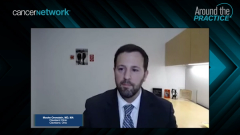
Patient Case 2 Continued and Clinical Trials
Patient Case 2 continues, and Drs Zhang and Orenstein discuss second-line trials for advanced renal cell carcinoma.
Episodes in this series

Toni Choueiri, MD: So, the patient was treated with ipi-nivo [ipilimumab/nivolumab] on the PDIGREE trial. And now, 18 months later, the patient has disease progression with increased lung nodule. We looked at the scans together with the radiologist. Next. So, what second-line treatment would you select for this patient? Let's look at the polling questions, and then discuss later some of the clinical trials in the second-line option, just high level, knowing that when we talk about sequencing and refractory disease, this is in the VEGF-TKI refractory setting, which doesn't much apply anymore, simply because the treatment paradigm has shifted to first-line IO-based combination in the vast majority of time. Let's take the poll now and go back to some of these trials in the second line, knowing some of them, actually, more recent ones, like the Tivo3, did include patient treated with prior immune checkpoint inhibitors. What second-line treatment would you select for this patient whose tumor progress on prior nivolumab and ipilimumab?
Tian Zhang, MD, MHS: If I may, Dr. Choueiri, just in the meantime, in thinking about sort of these sequencing questions, we're coming to a point where many of our patients are kind of coming through their first line, and we're making this treatment selection. And so, this is a pretty pertinent question, and one where you mentioned PDIGREE; I think PDIGREE is designed to help answer some of these sequencing questions, but it's certainly utmost in terms of thinking about what mechanisms are we trying to target? What are the patients resistant to from their first-line therapy? And how, then, do we broaden out, perhaps, their second-line treatments?
Toni Choueiri, MD: And I think you're right. If we look at the audience here, the audience picked cabozantinib or cabo-nivo in the majority, and these two arm on the PDIGREE trial. We could discuss that later. But, so far, I think around a bit over 40% of patients pick cabozantinib. In one minute, perhaps or less, Dr. Zhang, since we have you, the data for cabozantinib, that's post-TKI progression, very few patients had prior IO, but they're making your trial?
Tian Zhang, MD, MHS: Sure. METEOR was one of our early second-line trials; comparison between cabozantinib and everolimus. And it hit all its efficacy targets in terms of extending progression-free survival and overall survival, and also improving objective responses. We know cabozantinib in this second-line, their treatment face is a good option. And certainly, I think it's a viable choice for the second-line post ipi-nivo.
Toni Choueiri, MD: That's perfect. I think that's totally fair. The rest of the question, luckily, no one kept the volume of ipilimumab, but what we're seeing in the other option, that 10% of patients, or the other 43%, so the 57% would easily pick an IO-based combination despite the patient tumor progress on prior nivolumab and ipilimumab. Dr. Orenstein, what's the evidence for that? The patient progress on ipi-nivolumab [ipilimumab/nivolumab]; why would they get cabo-nivo [nivolumab/cabozantinib]? Or why would they get pembro [pembrolizumab]? I hear these drugs are interchangeable. Is there any data? Or are there any ongoing trials now?
Moshe Orenstein, MD, MA: There are a number of ongoing trials. I would say that for now, in terms of the data that are out there, the data is pretty sparse for using an IO-TKI following a progression on an IO-based therapy. There are some phase two data of lenvatinib and pembrolizumab, but again, these are not randomized data, these don't really stand up in terms of the test of what we expect before entering something as a standard of care. There is the CONTACT-03 trial, there is the TiNivo-2 trial, and these are trials, again, looking at the CONTACT-03 case atezolizumab and cabozantinib versus cabozantinib for patients post-IO therapy. The TiNivo-2 is tivozanib alone versus tivozanib with nivolumab. In patients whose cancer has progressed on IO-based therapy, I think we really need to see those data before we insert it as a standard of care. I would say there is a difference in how patients cancer progresses. If you have a patient who's been on IO-IO or IO-TKI, and they've had a good response upfront and a slow progression, and then at that point, you want to consider a different combination therapy. I might be more inclined to say that, OK, maybe this tumor still has some sensitivity and just needs a little switch. I think as a standard of care, if we're talking about what to do as standards, it would be, for me at least, to switch to either a single agent TKI or to switch to one of the options that wasn't on that list, lenvatinib and everolimus. In other words, to move away from the IO-based regimen, in an IO refractory setting as the immediate next therapy.
This transcript has been edited for clarity.
Newsletter
Stay up to date on recent advances in the multidisciplinary approach to cancer.









































